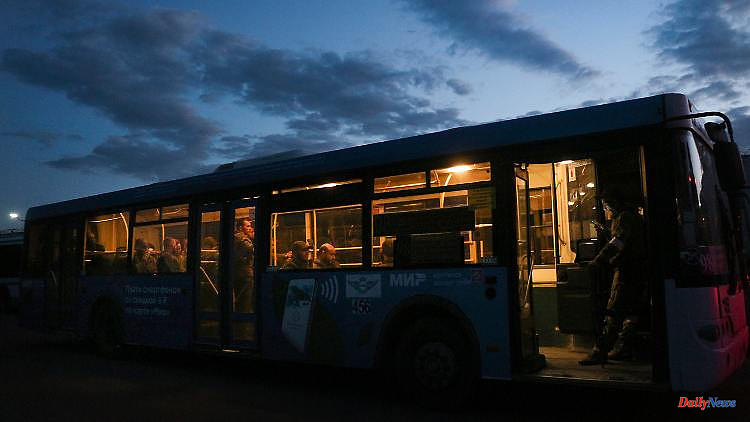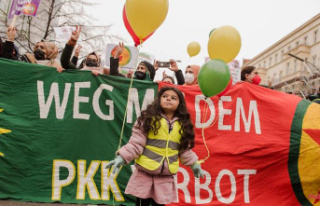Russia reports the surrender of nearly 1,000 Ukrainian "militants" at the Azov steelworks site. According to Ukrainian information, this is the number of soldiers who were still entrenched there.
According to Russian sources, hundreds of Ukrainian soldiers surrendered at the embattled Azov steelworks in the south-eastern Ukrainian city of Mariupol. Igor Konashenkov, spokesman for the Russian Defense Ministry, said 694 militants had laid down their arms in the past 24 hours, including 29 wounded.
Since Monday, a total of 959 fighters have surrendered, including 80 wounded. 51 of them were taken to a hospital in the "Donetsk People's Republic". Konashenkov spoke of "militants" and distinguished between "Azov nationalists" and Ukrainian soldiers.
It is unclear how many Ukrainian soldiers are still on the premises of the steel mill. Last week, Ukrainian authorities spoke of around 1,000 soldiers, the war correspondent of Russian state television of around 2,500 fighters. Civilians should no longer stay there, they had been taken away during evacuation operations.
According to the Mariupol City Council, the steel plant is to be demolished. Russia has no interest in rebuilding the city because from the Russian point of view it is only part of the Crimean Corridor. The occupiers tried to restore the port in order to move grain and metal products. "The Russians are plundering Mariupol," writes the city council on its Telegram channel. This information cannot be independently verified.
According to Russia's state news agency Ria Novosti, the detainees are being interrogated by Russian investigators "to identify them and verify their involvement in crimes against civilians." Prisoners of war cannot be punished under the Geneva Conventions for having fought against the country whose prisoners they became. However, the Ria report does not mention prisoners of war. The Russian invasion of Ukraine must not be called "war" in Russia. In every report on the "special operation", Ria points out that it is about the "denazification and demilitarization" of Ukraine and that the Ukrainian civilian population has nothing to fear.
Mariupol has been besieged by Russian troops since the beginning of March, and the city has now been almost completely destroyed. Thousands of civilians are believed to have died in the siege, the exact number is unknown. On April 21, Putin announced the "liberation" of Mariupol, since then only the site of the Azovstal steelworks has been kept.
The port city on the Azov Sea is important for Russia in several respects: Mariupol is part of the Donetsk region, but was not in the sphere of influence of the "Donetsk People's Republic", which Russia had founded in the Donbass. It is also on the land route from Russia to the Crimean Peninsula, annexed in 2014. Securing the land route should be a minimum goal of the war for Russia.
Fighting had already taken place around Mariupol in 2014, which ended in the defeat of the Russian-backed separatist militias. Russia and military expert Gustav Gressel from the European Council on Foreign Relations told ntv.de that Putin was "personally disappointed" that Mariupol didn't "immediately defect to the Russian arms" at the time. Accordingly, the siege of the city was also an act of personal revenge.
The capitulation of the first 264 soldiers on the site of the steel mill on Monday was described by both Ukraine and Russia as an "evacuation". According to the Ukrainian general staff, it had been agreed that they should be involved in future prisoner exchanges. "Ukraine needs Ukrainian heroes alive," said President Volodymyr Zelenskyy.
In contrast, Duma Chairman Vyacheslav Volodin said that "Nazi criminals" should not be eligible for such exchanges because they are "war criminals". According to the state-run Interfax news agency, the Russian Prosecutor General's Office applied to the Supreme Court to classify the Azov regiment as a terrorist organization. The case is scheduled to be heard on Thursday next week.
The Azov regiment is one reason why the battle for Mariupol is of great symbolic importance for Russia. The regiment was founded in 2014 as a volunteer battalion by right-wing extremists and even then played an important role in the city's defense. In the year it was founded, it was subordinated to the Ukrainian Ministry of the Interior. Eastern Europe expert Andreas Umland told the AFP news agency in April that the regiment had "de-ideologized" and developed into a normal combat unit. Nonetheless, the Kremlin uses the Azov regiment to claim that Ukraine is run by "extreme nationalists and neo-Nazis." In fact, a right-wing extremist party alliance only received 2.4 percent of the votes in the 2019 Ukrainian parliamentary elections, falling short of the five percent hurdle.
To the Ukrainians, all the defenders of the steel mill are heroes for holding out so long while tying down Russian troops that could not be deployed elsewhere. "The defenders of Mariupol, despite all the difficulties, carried out their orders, they held up the overwhelming forces of the enemy for 82 days and allowed the Ukrainian army to regroup, train more personnel and receive a large number of weapons from partner countries" , Azov commander Denys Prokopenko said in a video message on May 16.
6












